外研版高中英语必修二Book2Module1Grammar-将来时间的常见表达方法
外研版高中英语必修2 Module1 黄金英语语法:一般将来时的用法
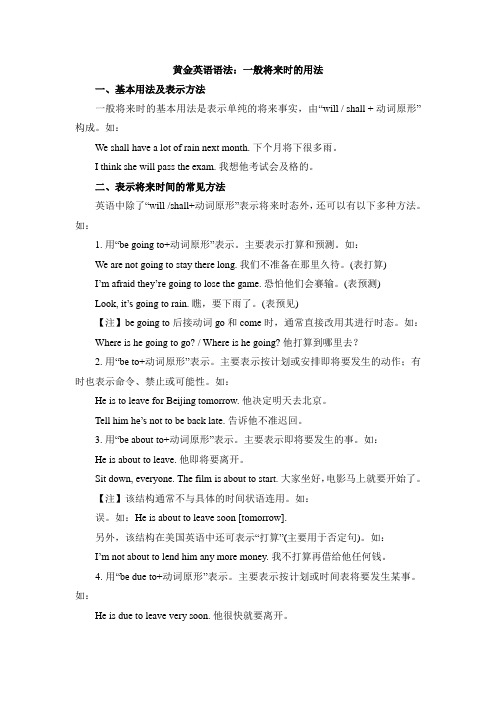
黄金英语语法:一般将来时的用法一、基本用法及表示方法一般将来时的基本用法是表示单纯的将来事实,由“will / shall + 动词原形”构成。
如:We shall have a lot of rain next month. 下个月将下很多雨。
I think she will pass the exam. 我想他考试会及格的。
二、表示将来时间的常见方法英语中除了“will /shall+动词原形”表示将来时态外,还可以有以下多种方法。
如:1. 用“be going to+动词原形”表示。
主要表示打算和预测。
如:We are not going to stay there long. 我们不准备在那里久待。
(表打算)I’m afraid they’re going to lose the game. 恐怕他们会赛输。
(表预测)Look, it’s going to rain. 瞧,要下雨了。
(表预见)【注】be going to 后接动词go和come时,通常直接改用其进行时态。
如:Where is he going to go? / Where is he going? 他打算到哪里去?2. 用“be to+动词原形”表示。
主要表示按计划或安排即将要发生的动作;有时也表示命令、禁止或可能性。
如:He is to leave for Beijing tomorrow. 他决定明天去北京。
Tell him he’s not to be back late. 告诉他不准迟回。
3. 用“be about to+动词原形”表示。
主要表示即将要发生的事。
如:He is about to leave. 他即将要离开。
Sit down, everyone. The film is about to start. 大家坐好,电影马上就要开始了。
【注】该结构通常不与具体的时间状语连用。
如:误。
如:He is about to leave soon [tomorrow].另外,该结构在美国英语中还可表示“打算”(主要用于否定句)。
外研版高中英语必修二单词表

外研版高中英语必修二单词表1. achieve -实现,达到(目标、愿望等)2. benefit -好处,益处3. citizen -公民,居民4. climate -气候,天气5. culture -文化,文明6. economy -经济,财政7. employer -雇主,老板8. environment -环境,自然界9. fact -事实,真相10. family -家庭,家人11. govern -管理,控制12. history -历史,往事13. income -收入,所得14. issue -问题,议题15. job -工作,职业16. law -法律,法规17. life -生活,生命18. live -生活,居住19. local -当地的,地方的20. matter -问题,事情21. medicine -药物,药品22. modern -现代的,时髦的23. money -钱,货币24. national -国家的,民族的25. news -新闻,消息26. official -官方的,正式的27. opinion -意见,观点28. party -派对,聚会29. peace -和平,安静30. people -人们,人口31. person -人,人员32. political -政治的,政党的33. problem -问题,难题34. public -公众的,大家的35. quality -质量,品质36. reason -原因,理由37. result -结果,后果38. rich -富有的,富足的39. right -权利,权限40. science -科学,学术41. security -安全,保证42. service -服务,业务43. society -社会,社团44. solution -解决方案,解答45. state -状态,状况46. step -步骤,脚步47. story -故事,小说48. study -学习,研究49. technology -技术,工艺50. time -时间,时机51. town -城镇,市镇52. traditional -传统的,惯例的53. travel -旅行,旅游54. unemployment -失业,失业率55. university -大学,母校56. urban -城市的,城镇的57. vary -变化,不同58. view -观点,看法59. wage -工资,报酬60. winner -获胜者,得奖者61. workplace -工作场所,职场62. world -世界,宇宙63. year -年,年度64. young -年轻的,年幼的65. adult -成人,成年人66. age -年龄,年代67. ahead -在前面,预先68. aim -目标,宗旨69. alive -活着的,活泼的70. alone -单独的,孤独的71. answer -回答,答案72. animal -动物,野兽73. another -另一个,再一74. any -任何的,无论哪个75. area -区域,面积76. arm -手臂,武器77. around -围绕,四周78. art -艺术,技艺79. as -作为,当作80. ask -问,请求81. at -在,于82. back -后面,背部83. bad -坏的,不好的84. bag -袋子,背包85. ball -球,球体86. band -乐队,团体87. base -基础,底部88. basic -基本的,基础的89. be -是,存在90. beach -海滩,海滨91. beauty -美,美丽92. because -因为93. become -成为,变为94. bed -床,卧室95. bee -蜜蜂,蜂96. before -在...之前97. begin -开始,着手98. behind -在...后面99. believe -相信,认为。
高中英语外研版必修2Module 1 Section Ⅲ Grammar— 名词用作动词及will和be going to表示将来
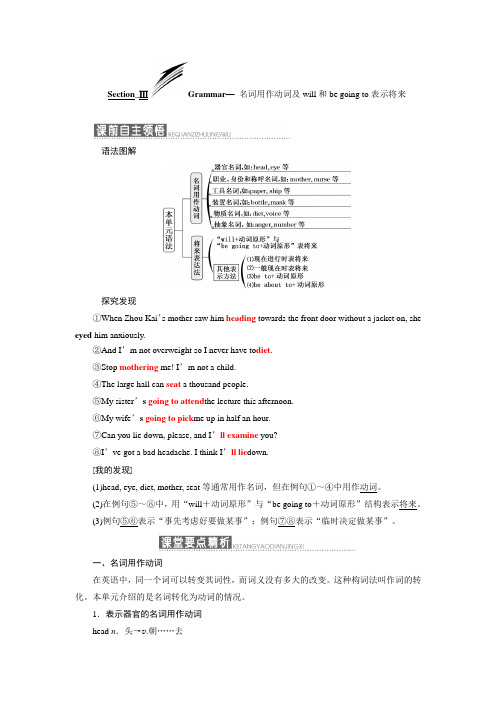
Section_ⅢGrammar—名词用作动词及will和be going to表示将来语法图解探究发现①When Zhou Kai’s mother saw him heading towards the front door without a jacket on, she eyed him anxiously.②And I’m not overweight so I never have to diet.③Stop mothering me! I’m not a child.④The large hall can seat a thousand people.⑤My sister’s going to attend the lecture this afternoon.⑥My wife’s going to pick me up in half an hour.⑦Can you lie down, please, and I’ll examine you?⑧I’ve got a bad headache. I think I’ll lie down.[我的发现](1)head, eye, diet, mother, seat等通常用作名词,但在例句①~④中用作动词。
(2)在例句⑤~⑧中,用“will+动词原形”与“be going to+动词原形”结构表示将来。
(3)例句⑤⑥表示“事先考虑好要做某事”;例句⑦⑧表示“临时决定做某事”。
一、名词用作动词在英语中,同一个词可以转变其词性,而词义没有多大的改变。
这种构词法叫作词的转化。
本单元介绍的是名词转化为动词的情况。
1.表示器官的名词用作动词head n.头→v.朝……去hand n.手→v.交出;传递face n.脸→v.面对back n.背→v.倒车;支持shoulder n.肩膀→v.肩负;承担nose n.鼻子→v.闻出;觉察eye n.眼睛→v.注视When the famous star came in, all people eyed her.当那位著名明星进来时,所有的人都注视着她。
高中英语外研版 单词表 必修2
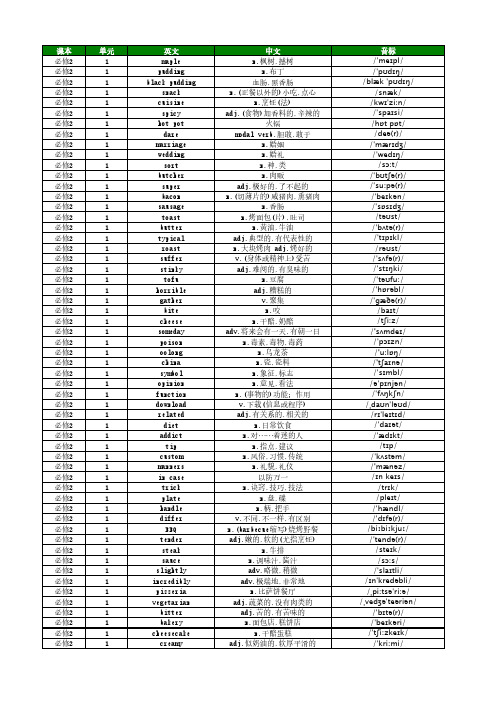
3
plastic
adj.塑料制的
/ˈplæstɪk/
3
/dɪˈzɜ:t/
2
attract
v.吸引,引起……的兴趣
/əˈtrækt/
2
firework
n.烟火,烟花
/ˈfaɪəwɜ:k/
2
decorate
v.装饰,布置,美化
/ˈdekəreɪt/
2
riddle
n.谜,谜语
/ˈrɪdl/
2
competition
n.比赛,竟赛
/ˌkɒmpəˈtɪʃn/
2
formal
必修2
2
envelope
n.信封
必修2
2
pole
n.(行星)地极,(地球)南北极
必修2
2
handwritten
adj.手写的
必修2
2
regular
adj.频繁的,经常的
必修2
2
polar
adj.地极的
必修2
2
roof
n.(建筑物、汽车等)顶,顶部
必修2
2
complain
v.抱怨,不满,发牢骚
必修2
2
adv.不管,不顾
必修2
2
inequality
n.(社会上的)不平等
必修2
2
fantasy
n.幻想,想象
必修2
2
novel
n.(长篇)小说
必修2
2
limitless
adj.无限的
必修2
2
regard
v.认为,看作
必修2
2
regard ... as ...
必修2 M1 Grammar 将来时

用一般现在时表将来
主要用于表示根据日历、时间表,时刻表等 规定预计要发生的动作。常用的有 be,arrive, begin, come, go, leave, return, start, stay等。 eg. School begins on February 5. 学校将于2月5日开学。 eg. The plane takes off at 15: 05. eg. The meeting is at 9:00 tomorrow morning. 会议将在明天九点开始。
GRAMMAR 2 future tense 一般将来时主要有一下几种形式 1. will do 2. be going to do 3. be to do 4. be about to do 5. 用现在进行时表将来 6. 用一般现在时表将来
用will的情况
a. will表示客观上将来势必发生的事情。 eg. It will become warm when spring comes. eg. Tomorrow will be Friday. b. 表示说话人的揣测。 eg. She will be right after taking the medicine. eg. Put on your jacket. You will get a cold. eg. You will be probably feel better in a few days.
Complete the sentences with will or be going to. A You use will when the speaker ___ decides to do something as he speaks. be going to B You use __________ when someone has decides to do something before.
必修二英语外研版单词表
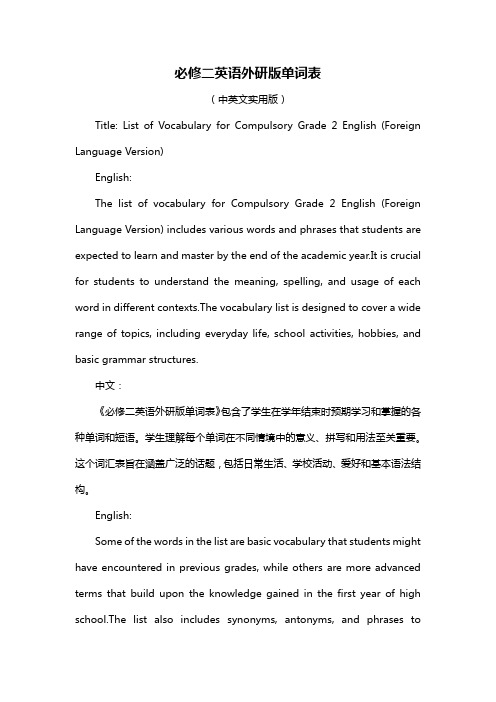
必修二英语外研版单词表(中英文实用版)Title: List of Vocabulary for Compulsory Grade 2 English (Foreign Language Version)English:The list of vocabulary for Compulsory Grade 2 English (Foreign Language Version) includes various words and phrases that students are expected to learn and master by the end of the academic year.It is crucial for students to understand the meaning, spelling, and usage of each word in different contexts.The vocabulary list is designed to cover a wide range of topics, including everyday life, school activities, hobbies, and basic grammar structures.中文:《必修二英语外研版单词表》包含了学生在学年结束时预期学习和掌握的各种单词和短语。
学生理解每个单词在不同情境中的意义、拼写和用法至关重要。
这个词汇表旨在涵盖广泛的话题,包括日常生活、学校活动、爱好和基本语法结构。
English:Some of the words in the list are basic vocabulary that students might have encountered in previous grades, while others are more advanced terms that build upon the knowledge gained in the first year of high school.The list also includes synonyms, antonyms, and phrases toenhance students" understanding and usage of the words.Additionally, students are encouraged to practice writing and speaking the vocabulary words in order to fully grasp their meanings and usage.中文:列表中的一些单词可能是学生在之前年级已经遇到的basic vocabulary,而其他一些则是建立在高中第一年所获得的知识之上的更高级的term。
高中英语必修二知识点外研版

必修二Module 11. see +宾语+ doing (正在做)hear do (全过程)done (被动)2.fit adj: 健康的keep fit合适的be fit for/ to dov: 适合,合身(大小,形状)fit in 相处融洽suit 适合(颜色,款式,时间)⒊as ①当…时候②由于③随着As time goes on,…..④按照do as (you are) told⑤正如As you can see,As we all know,As is known to us,⒋不定式作定语的用法归纳1). 被修饰名词前有序数词、形容词最高级或the only, the last, the very, the next修饰时,常用不定式作后置定语。
被修饰名词和不定式具有逻辑主谓关系。
Eg. John Smith is the only person to know the secret.2).表示抽象概念的名词,后面用动词不定式做定语,用于解释中心词的内容,如ability, way, ambition, anxiety, attempt, campaign, chance, courage, decision, determination等。
3).如不定式动词是不及物动词作定语时,其后须加一个适当的介词。
例如:Have you got a chair to sit on? 你有椅子坐了吗?⒌⑴pay~ 的短语①注意pay attention to②拜访pay a visit to③付清,还清(债务);得到回报pay off⑵ buy sth for some money 用多少钱买某物sb. spend money on sth. / in doing sth. 把钱花在…上sth. cost (sb.) money (某物)花了(某人)多少钱⒍sure1).make sure that do(时态)When you leave the office, make sure that all the lights are turned off.(灯关上了)2).make sure of / about 确保,弄清楚You’d better make sure of the time and place for the meeting .(弄清楚开会得时间和地点) 3) be sure to do肯定会,务必Be sure to come on time.be sure of / about 有把握,肯定He is to succeed/ win. 他肯定会赢。
高中英语必修2第2单元-一grammer般将来时被动语态
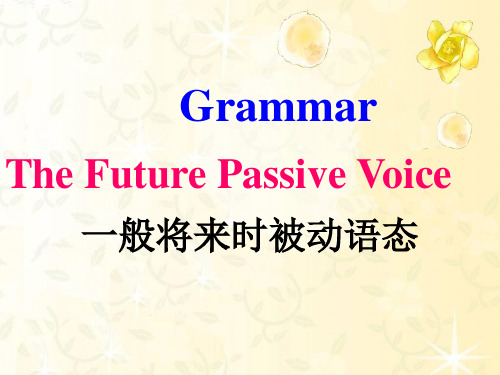
使用一般将来时的被动语态需注意的几个问题:
1.在时间状语从句或条件状语从句中,常用一般 现在时的被动语态代替一般将来时的被动语态。 eg. when the dam is completed, the flood in this area will be controlled.
从A、B、C、D四个选项中,选出可以填 入空白处的最佳选项。
1. The young man says that he will leave the company if he _C___ for this.
A.will be punished B. would be punished
C. is punished D. is going to be punished
•答案 A
•④ —Why don't we choose that road to save
time?
•—The bridge to it________.(四川)
•A.has repaired
B.is repaired
•C.is being repaired D.will be repaired
5. The question is going to _b_e_d_i_s_c_u_s_se_d__ (discuss) by us. 6. The little girl is so pretty that she _w_i_ll_b__e_a_d_m__ir_e_d_ (admire) by all the people when she grows up.
tomorrwoiwll.
/
shall
高三英语一轮复习 必修二 unit2 grammar一般将来时被动语态

5. The question is going to _b_e_d_i_s_c_u_s_se_d__ (discuss) by us. 6. The little girl is so pretty that she _w_i_ll_b__e_a_d_m__ir_e_d_ (admire) by all the people when she grows up.
7. Don’t worry about that. Itw_i_ll_b_e__fi_n_i_sh__ed (finish) next week. 8. She _w__il_l_b_e_m__e_t_ (meet) by her friends as soon as she arrives. 9. I hear that more than one million dollars _w_i_ll_b__e_s_p_e_n_t (spend) on the project next year.
使用一般将来时的被动语态需注意的几个问题:
3.在时间状语从句或条件状语从句中,常用一般 现在时的被动语态代替一般将来时的被动语态。 eg. when the dam is completed, the flood in this area will be controlled.
4. 在否定中注意not的位置应位于第一个助动 词shall 或will之后,而不是be 动词之后。 eg.The child will be not allowed to play outside. The child will not be allowed to play outside.
外研版高中英语必修2各单元语法总结
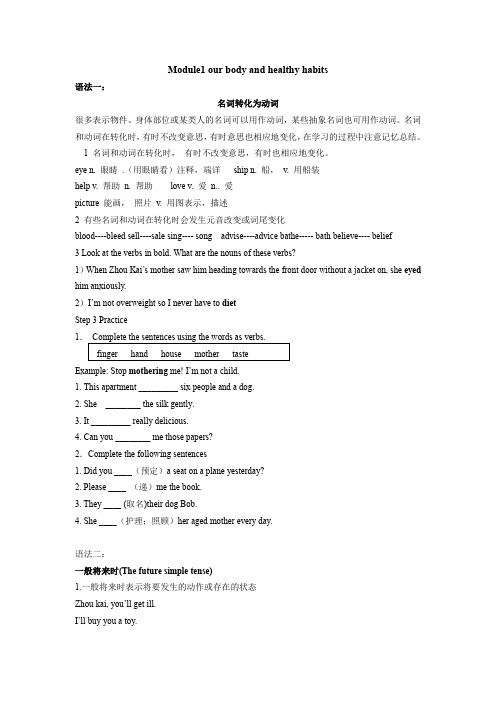
Module1 our body and healthy habits语法一:名词转化为动词很多表示物件、身体部位或某类人的名词可以用作动词,某些抽象名词也可用作动词。
名词和动词在转化时,有时不改变意思,有时意思也相应地变化,在学习的过程中注意记忆总结。
1 名词和动词在转化时,有时不改变意思,有时也相应地变化。
eye n. 眼睛.(用眼睛看)注释,端详ship n. 船,v. 用船装help v. 帮助n. 帮助love v. 爱n.. 爱picture 能画,照片v. 用图表示,描述2 有些名词和动词在转化时会发生元音改变或词尾变化blood----bleed sell----sale sing---- song advise----advice bathe----- bath believe---- belief3 Look at the verbs in bold. What are the nouns of these verbs?1)When Zhou Kai’s mother saw him heading towards the front door without a jacket on, she eyed him anxiously.2)I’m not overweight so I never have to dietStep 3 Practice1.Complete the sentences using the words as verbs.finger hand house mother tasteExample: Stop mothering me! I’m not a child.1. This apartment _________ six people and a dog.2. She ________ the silk gently.3. It _________ really delicious.4. Can you ________ me those papers?2.Complete the following sentences1. Did you ____(预定)a seat on a plane yesterday?2. Please ____ (递)me the book.3. They ____ (取名)their dog Bob.4. She ____(护理;照顾)her aged mother every day.语法二:一般将来时(The future simple tense)1.一般将来时表示将要发生的动作或存在的状态Zhou kai, you’ll get ill.I’ll buy you a toy.My sister’s going to see you off.will和be going to都可以用来表达将要发生的事情,区别如下:(1).单纯谈到将来的事情,没有主观因素,可用will.It will become warm when spring comes.春天到来,天气将会变暖。
高中英语必修二unit2语法一般将来时的被动语态教学内容共24页

•
26、我们像鹰一样,生来就是自由的 ,但是 为了生 存,我 们不得 不为自 己编织 一个笼 子,然 后把自 己关在 里面。 ——博 莱索
•
27、法律如果不讲道理,即使延续时 间再长 ,也还 是没有 制约力 的。— —爱·科 克
•
28、好法律是由坏风俗创造出来的。 ——马 克罗维 乌斯
•
29、在一切能够接受法律支配的人类 的状态 中,哪 里没有 法律, 那里就 没有自 由。— —洛克
•
30、风俗可以造就法学内容
6、最大的骄傲于最大的自卑都表示心灵的最软弱无力。——斯宾诺莎 7、自知之明是最难得的知识。——西班牙 8、勇气通往天堂,怯懦通往地狱。——塞内加 9、有时候读书是一种巧妙地避开思考的方法。——赫尔普斯 10、阅读一切好书如同和过去最杰出的人谈话。——笛卡儿
Thank you
外研版高中英语必修二知识点最新总结-短语短语 语法

—-可编辑修改,可打印——别找了你想要的都有!精品教育资料——全册教案,,试卷,教学课件,教学设计等一站式服务——全力满足教学需求,真实规划教学环节最新全面教学资源,打造完美教学模式必修二Module 1重点词组:1. be crazy about / like crazy / drive sb. crazy2. be on diet / go on diet节食3. be connected with / connect with / connect to/ in connection with/ have no / some connection with4. begin / start with以…开始5. lose weight / put on weight6. take exercise= exercise7. lie down 躺下8. take turns to do / at doing sth./in turn/by t urns9. put…into…将…投入…11. keep…away使离开12. have a sweet tooth好吃甜食15. or anything / anything but / if anything或者怎么的/绝不/若要说16. be anxious for / be eager for / be thirsty for渴望be anxious/worried about / be anxious to do 担忧17. a bit (of) / a little / not a bit=not…at all / not a little=very much 19. contribute (…) to (doing) sth./ make contributions / a contribution to (doing) sth.20. breath in (out) / out of breath / hold one’s breath/ cat ch one’s breath/breathe deeply(踹口气)21. in need (of) / meet (satisfy) one’s need(s)22. pick up / pick out23. imagine (sb./ sb.’s) doing sth. / beyond imagination24. the problem (matter / wrong) with…/ have problems with……的问题/有…的问题25. result in / result from / as a result / as a result of26. make a prediction27. have a temperature/fever 发烧28. take in29. head towards/to/for…朝……前进30 miss school 缺课31 return to normal/ above normal/ below normal恢复正常/超过正常标准/低于正常标准32 be off work/be out of work// be at work不工作,休息/失业在上班33 a free health care system/免费医疗体系34. kind of 稍微35. at least / not in the least (= not at all, not a bit)36. pay off还清知识要点:1.See/hear+宾语+ doing (正在做) / do (全过程) / done (被动)2. fit adj: 健康的 keep fit; 合适的 be fit for/ to doV: 适合,合身(大小, 形状) fit inSuit 适合(颜色, 款式, 时间)3. would rather do sth 宁愿做would rather that主+ did sth. 宁愿某人做某事(过去时表示现在和将来的情况)would rather that主+ had done宁愿某人做某事(过去完成时表示过去情况) 4. as ①当…时候②由于③随着 As time goes on ④按照do as (you are) told⑤正如As you can see/ As we all know/ As is known to us.5. rarely, hardly, scarcely, seldom, not , never, little等位于句首, 句子使用部分倒装语序.6.句型: The reason why / for which … is that…: 那就是…的原因, 那是因为…(接原因)This / That / It is because…/ That + 从句 + is because: 那是因为…(接原因)This / That / It is why…: 那是因为…(接结果)7. 辨析: injure(伤害), would(伤口,伤害), hurt(精神受伤) & cut(割伤)8. Pay 的用法Pay (sb.) money for sth /pay for sth.付款买sth/pay for sb.替某人付款 pay sb.付钱给某人=sb. spend money on sth/in doing sth/ sth cost (sb.) money9. sure 的用法1). Make sure that 主语+do(时态)when you leave the office, make sure that the lights are tured off. 2). Make sure of/ about确保,弄清楚You’d better make sure of the time and place for the meeting.3). Be sure of/ about有把握, 肯定he is sure of his success.=he is sure that he will succeed4). Be sure to do肯定会,务必 Be sure to come on time.10. way构成的短语: by the way, by way of, in the way, in a way, in no way, make one’s way, find one’s way, fight one’s way, feel one’s way, push one’s way, shoulder one’s way, lose one’s way, clear the way, lead the way11. 比较: till & until引导时间状语(从句)的用法(可转换成when或after 引导的时间状语从句,但主句必须要用肯定形式)如:They didn’t get off until the train came to a complete stop.=they got off after the train…He won’t come into the room until the teachers finish their work.= He will come into the room when the …语法要点1. 一般将来时1)will do sth/ shall do sth单纯表示将来要发生的动作,不强调已经打算好。
外研社2019版高中英语必修二单词表
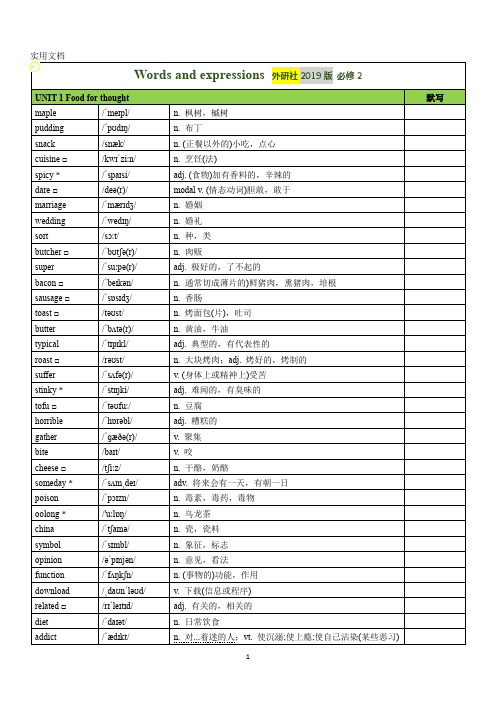
Words and expressions 外研社2019版必修2UNIT 1 Food for thought默写maple/ˈmeɪpl/n. 枫树,槭树pudding/ˈpʊdɪŋ/n. 布丁snack/snæk/n. (正餐以外的)小吃,点心cuisine □/kwɪˈziːn/n. 烹饪(法)spicy * /ˈspaɪsi/adj. (食物)加有香料的,辛辣的dare □/deə(r)/modal v. (情态动词)胆敢,敢于marriage/ˈmærɪdʒ/n. 婚姻wedding/ˈwedɪŋ/n. 婚礼sort/sɔːt/n. 种,类butcher □/ˈbʊtʃə(r)/n. 肉贩super/ˈsuːpə(r)/adj. 极好的,了不起的bacon□/ˈbeɪkən/n. 通常切成薄片的)鲜猪肉,熏猪肉,培根sausage□/ˈsɒsɪdʒ/n. 香肠toast□/təʊst/n. 烤面包(片),吐司butter/ˈbʌtə(r)/n. 黄油,牛油typical/ˈtɪpɪkl/adj. 典型的,有代表性的roast□/rəʊst/n. 大块烤肉;adj. 烤好的,烤制的suffer/ˈsʌfə(r)/v. (身体上或精神上)受苦stinky * /ˈstɪŋki/adj. 难闻的,有臭味的tofu□/ˈtəʊfuː/n. 豆腐horrible/ˈhɒrəbl/adj. 糟糕的gather/ˈɡæðə(r)/v. 聚集bite/baɪt/v. 咬cheese□/tʃiːz/n. 干酪,奶酪someday * /ˈsʌmˌdeɪ/adv. 将来会有一天,有朝一日poison/ˈpɔɪzn/n. 毒素,毒药,毒物oolong * /'uːlɒŋ/n. 乌龙茶china/ˈtʃaɪnə/n. 瓷,瓷料symbol/ˈsɪmbl/n. 象征,标志opinion/əˈpɪnjən/n. 意见,看法function/ˈfʌŋkʃn/n. (事物的)功能,作用download/ˌdaʊnˈləʊd/v. 下载(信息或程序)related□/rɪˈleɪtɪd/adj. 有关的,相关的diet/ˈdaɪət/n. 日常饮食addict/ˈædɪkt/n. 对...着迷的人;vt. 使沉溺;使上瘾;使自己沾染(某些恶习)12345678910litre * /ˈliːtə(r)/n. 升,公升campaign□/kæmˈpeɪn/n. (宣传)活动urge□/ɜːdʒ/v. 竭力主张,强烈要求,敦促canteen□/kænˈtiːn/n. (工厂、学校等的)食堂,餐厅concerned/kənˈsɜːnd/adj. 焦急的,担忧的,有关的,有牵连的,关切的,关心的contribute/kənˈtrɪbjuːt/v. 促成,造成(某事发生);捐献,捐助,捐赠;撰稿,投稿average/ˈævərɪdʒ/adj. 平均(数)的,普通的due to 由于,因为take…into account 把……考虑进去in fear 恐惧地be scared/frightened/afraid of 害怕、恐惧...cut...off 切掉have a(n)... effect upon 对... 有... 的影响see... as 把... 看作the other way round 反过来,反之亦然mistake... for 错把... 当作break down (机器或车辆)出毛病,损坏;分解stand-by mode 待机模式common sense 常识注:词汇表中,未加符号的单词为必修单词;加□的为选择性必修单词;加*的为未作要求的单词。
外研版 Book 2 Module 1 Grammar 一般将来时的表达方法
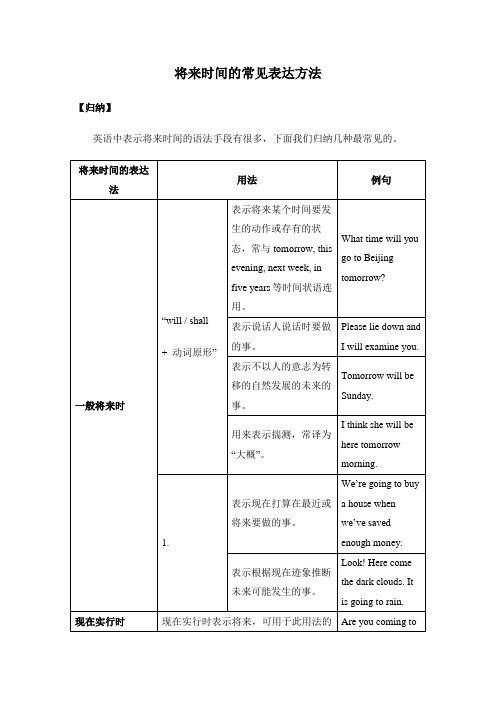
将来时间的常见表达方法【归纳】英语中表示将来时间的语法手段有很多,下面我们归纳几种最常见的。
【即学即练】根据括号内的汉语提示补全下列句子。
1. You needn’t come this afternoon. _________________ (明天我去看你吧).2. The school sports meeting ___________________ (将在下周举行).3. It’s 6 p.m. now. ____________________ (我觉得他今天下午不会来了).4. The plane ___________________ (还有三个小时起飞), so we still have time for dinner.5. ___________________ (我正要出门) when the phone rang.6. —I thought I asked you to repair the radio.—Oh. I am sorry. _______________________ (我马上修理它).7. Remember _______________________ (你必须10点前回来).8. I don’t know if he will come tomorr ow. _______________________ (如果他来了,我会告诉你的).答案【归纳】1. be going to 2. 一般现在时【即学即练】1. I’ll visit you tomorrow2. will / is going to be held next week3. I think he won’t come this afternoon4. takes off in three hours5. I was about to go out6. I will repair it right now7. you are to be back by 10 o’clock8. If he comes, I will tell you。
外研版高一英语必修2_Module1_精品推荐:一般将来时的几种表达法
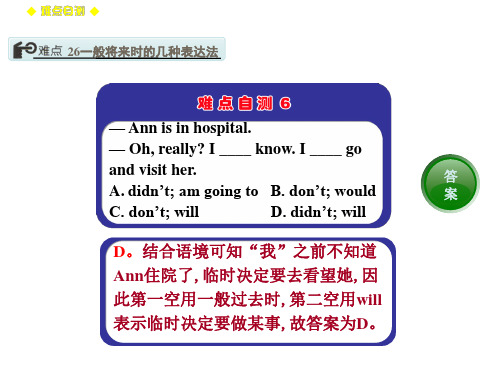
A。此处动词为begin,表示按计划、 安排将要发生的动作,用一般现在 时,故答案为A。
◆
◆
26一般将来时的几种表达法
Stand over there and you __ able
to see the oil painting better.
A. are
B. will be
C. were
D. would be
事先考虑过要做某事, 用be going to;临时决定要做某事用wi接
“--b-eT-g-oo-miYngoisutoiln+evfht”otsh表pei说tlai话lg.h人t o根n据. 已 从根语据L境答oo来语k看“a,tI tk“hnoo我swe去”b把知la灯c,说k关话c掉lo人u”事d这s先!一
例句
I’m leaving for Shanghai on Friday.周五我要去上海。 When are you going back to your hometown? 你什么时候回家乡?
◆
◆
26一般将来时的几种表达法
7. 一般现在时表将来
按规定、时间表将要发生的动作用一般现在时。
例句
Tomorrow is Friday, My plane starts at 6 pm. When does the exhibition begin? According to the timetable, the train leaves at 8 am.
案
A. finished; are going B. finished; go
C. finishes; are going D. finishes; go
C。考查动词的时态。根据语境可知,电影 “结束”这个动作是按规定、时间表将要发 生的,所以用一般现在时。后面句子中应用 现在进行时表将来,表示电影结束后我们打 算去书店,所以答案为C。
外研版英语必修2-2grammar1

时间状语从句
when,
1.when表示点时间时,从句中用短暂性动词;表示段时间时, 用持续性动词,可表两个动作同时进行,也可以一先一后。
“当….时候” eg. When I got home, my family were already having dinner. 我到家的时候,全家已在吃晚饭。 (when表示点时间) When they were still talking and laughing, the teacher came in. 当他们还在说笑的时候,老师进来了。(when表示段时间) He waved a hello when he saw her. 当他看见她的时候,就挥手打了个招呼。(when表示点时间) When you think you know nothing, you begin to know something. 当你认为自己一无所知的时候,就开始知道一些事情了。(when表 示一段时间)
It is/ has been +一段时间+since 从 句(did) 延续性动词:反过来翻译
短暂性动词:直译
before 从句往往带有否定的含义。 eg. He ran off before I could stop him. 我还没来得及阻止他,他就跑掉了。 Take it down before you forget it. 趁着还没忘记的时候就记录下来。
till, until
时间状语从句
1.Until/till用于肯定句时,表示直到…为止,主句必须为持续性动词。 eg. We shall wait until/till he comes back. 我们将一直等到他回来。 Everything went well until/till that accident happened. 直到发生那意外之前,一切都正常。 2. not…until/till表示直到…才,主句通常要用短暂动词,这时until和till可用 before代替。 eg. I didn't leave until / till before she came back. 直到她回来,我才离开的。 People do not know the value of their health till until before they lose it 人们直至失去了健康才知其可贵。 3.当not until位于句首时,主句中的主语、谓语要使用倒装语序。 eg. Not until she stopped crying did I leave. 直到她不哭了,我才离开的。 4. 在强调句型中一般只用until,不用till eg. It was not until she took off her dark glasses that I recognized her.
外研版高中必修2语法集锦
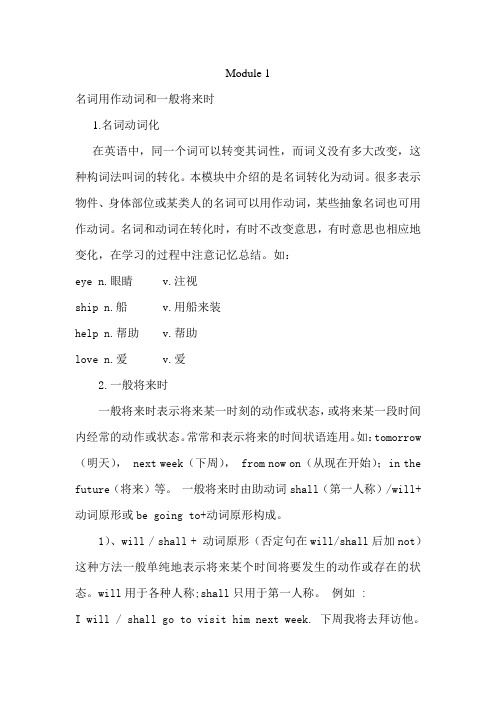
2)、be going to动词原形
be going to相当于一个助动词(其中be有人称和数的变化),与它后面的动词原形一起构成谓语。用来表示近期将要发生的动作以及计划、安排和打算要做的事。例如:
There is going to be a football match this afternoon.今天下午将有一场足球赛。
1)动词不定式作结果状语
I hurried to his house, only to find him out.
我急急忙忙赶到他家,结果却发现他不在家。
The Arab woke up to find that his camel had put his head inside the tent.(不定式作结果状语)
到昨晚9点钟,我们已经收到200张飞船发来的图片。
(2)表示由过去的某一时刻开始,一直延续到过去另一时间的动作或状态,常和for, since构成的时间状语连用。例如:
I had been at the bus stop for 20 minutes ቤተ መጻሕፍቲ ባይዱhen a bus finally came.
I‘m going to go to the park.我将要去公园。
Module 2
不定式表目的、结果状语
1.不定式作目的状语
不定式和不定式短语作目的状语,主要用来修饰动词,表示某一动作或状态的目的。为了使目的意义更加清楚或表示强调意义时,还可以在前面加in order to或so as to。例如:
I've written it down in order not to forget.
- 1、下载文档前请自行甄别文档内容的完整性,平台不提供额外的编辑、内容补充、找答案等附加服务。
- 2、"仅部分预览"的文档,不可在线预览部分如存在完整性等问题,可反馈申请退款(可完整预览的文档不适用该条件!)。
- 3、如文档侵犯您的权益,请联系客服反馈,我们会尽快为您处理(人工客服工作时间:9:00-18:30)。
GRAMMAR
将来时间的常见表达方法
【归纳】
英语中将来时间的表达法有很多,下面我们归纳几种最常见的。
结构用法例句
一般将来时will +动
词原形
表示将来某个时间要发生的动作或存
在的状态,常与tomorrow, next week,
in five years等时间状语连用。
I will visit my uncle
tomorrow.
表示说话人说话时要做的事。
Please come here and I
will tell you what to do.
用来表示揣测,常译为“大概”。
I think our new teacher
will be here next week.
be going
to +动词
原形
表示说话者已经决定的计划或安排要
做的事。
My hair is dirty. I’m going
to wash it.
表示说话者根据现在的现象或征兆
“预测”不久即将发生的事情。
The weather forecast says
that it’s going to be warm
tomorrow.
现在进行时现在进行时可以表示将来,可用于此用法的动词
有arrive, come, die, go, leave, return, start等。
My older brother is coming
home on Thursday.
一般现在时表示根据规定、日历、时间表预计要发生的事。
What time does the train
leave?
用在时间或条件状语从句中,表示将来。
I’ll call you again when I
arrive at the station.
“be to +动词原形”结构表示将要发生的动作,可表示安排好的事,也可
表示要求做的事。
We are to have a meeting
next week.
You are to deliver these
flowers before 10.
“be about to +动词原形”结构表示马上就要发生的动作,不与表示将来的时间
状语连用。
Look! The match is about
to start.
【即学即练】
I. 用will或be going to完成下面句子。
1. —Did you tell your mother about the result?
—Oh, no, I forgot. I ________ call her now.
2. I ________ be a teacher after I leave school.
3. Open your mouth, please, and I ________ examine you.
4. Hank says he ________ stop smoking.
5. There ________ be a speech contest next Saturday in our school.
6. Spring ________ come again.
II. 根据括号内的提示翻译下面句子。
1. 下个月,埃米将19岁了。
(will) ___________________________________________________________________
2. 你今天晚上打算干什么?(be going to) ___________________________________________________________________
3. 我们将在校门口见面。
(be to)
___________________________________________________________________
4. 这堵墙将被漆成绿色。
(be going to)
___________________________________________________________________
5. 电影即将开始。
(be about to)
___________________________________________________________________
6. 飞机将于2点30分起飞,4点20分抵达上海。
(一般现在时表将来)
___________________________________________________________________
III. 根据括号内的汉语提示补全下面句子。
1. You needn’t come this afternoon. _________________ (明天我去看你吧).
2. The school sports meeting ___________________ (将在下周举行).
3. It’s 6 p.m. now. ____________________ (我觉得他今天下午不会来了).
4. The plane ___________________ (还有三个小时起飞), so we still have time for dinner.
5. ___________________ (我正要出门) when the phone rang.
6. —I thought I asked you to repair the radio.
—Oh. I am sorry. _______________________ (我马上修理它).
7. Remember _______________________ (你必须10点前回来).
8. I don’t know if he will come tomorrow. _______________________ (如果他来了,我会告诉你的).
参考答案
I. 1. will 2. am going to 3. will 4. is going to 5. will / is going to 6. will
II. 1. Next month, Amy will be nineteen.
2. What are you going to do this evening?
3. We are to meet at the school gate.
4. The wall is going to be painted green.
5. The film is about to start.
6. The plane takes off at 2:30 and arrives in Shanghai at 4:20.
III. 1. I’ll visit you tomorrow
2. will / is going to / is to be held next week
3. I think he won’t come this afternoon
4. takes off / will take off in three hours
5. I was about to go out
6. I will repair it right now
7. you are to be back by 10 o’clock
8. If he comes, I will tell you Common Progress Please Criticize。
